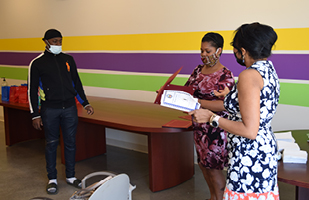Drug Court Embraces In-Person Graduation… at a Distance

Cleveland Municipal Judge Lauren Moore, far right, hands Frank Q. Jackson, left, his drug court graduation certificate. Jackson is the grandson of Cleveland Mayor Frank Jackson.

Cleveland Municipal Judge Lauren Moore, far right, hands Frank Q. Jackson, left, his drug court graduation certificate. Jackson is the grandson of Cleveland Mayor Frank Jackson.
An Ohio drug court was the first in the state to have an “old-fashioned” celebration during the “new normal.”
The Greater Cleveland Drug Court recently conducted its 65th graduation ceremony in person while adhering to safety protocols to prevent the spread of the coronavirus, including wearing face masks and social distancing.
Judge Michelle Earley, the administrative and presiding judge of Cleveland Municipal Court, expressed how proud she was for what the 19 graduates accomplished.
“I had to come here to see the people who completed the drug court program in the middle of a pandemic, said Judge Earley.
Judge Lauren Moore, who presides over the specialized docket, discussed how difficult it was to conduct the program under the circumstances. In-person meetings couldn’t be held, there were constraints on how court staff and counselors could provide services to address underlying causes of the substance-use behavior, and participants had accountability concerns with the isolation and reduced frequency of drug screenings.
Despite all those obstacles, the successful applicants finished all the requirements as scheduled and attended the event at the Northern Ohio Recovery Association’s main office near downtown Cleveland. Since the program began in 1998, more than 1,800 people have completed it. The process takes a year, but can extend to two years – or longer – depending on an individual’s struggles with substance use.
Brenda Moore – a graduate of the program in February – returned to address some of her peers and filled the void of the graduates’ loved ones, who weren’t able attend the ceremony due to public health guidelines. The 63-year-old, who now lives in sober housing, had a 40-year bout with crack cocaine.
“Judge Moore made me feel like recovery was my idea and it worked My advice to all graduates: We are just one bad decision away from relapse. And when that happens, everything you worked for is gone,” she added.


